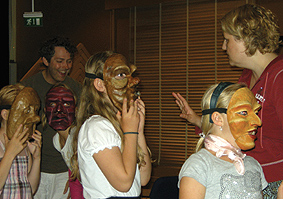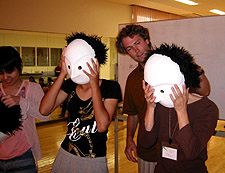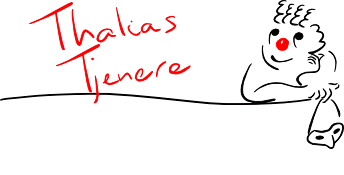

Each course is tailored to suit your needs. If you have special wishes or ideas, you are more than welcome to contact us.
Basic training and Acting techniques
The play’s the thing – a basic course in physical acting
The actor is always in communication – not only with the voice and face. The language of the body must also be mastered. Physical habits and inhibitions find their way to unconscious expression, and thus stand in the way of spontaneity, creativity, and truth. Via physical play, we can work to put our heads “on the shelf” and find a path to a true release which will open the door to authentic character choices.
In english, the word for the stage performer’s art is to ACT, the word meaning “to do something.” This is not a coincidence. And believable acting consists of physical actions and choices. The actor must learn to ask herself: “what do I do” rather than the less reliable “what do I feel” or even less performable “who am I.” In this way, the actor’s work becomes both concrete, accessible, and fun! One discovers then quite quickly that gesture and movement inevitably will affect our inner life.
In this course, we will explore physical tools which can be used to create a strong communication between performer and audience. Theough use of techniques from the melodrama and mask play, we will allow the actor’s impulses to take shape and become living.
Security + release = creativity. Creativity + form = art!
Masker – Spilleteknik
We all know the mask from Halloween or Carnival, and the feeling of freedom when we – for a moment – can step into a new identity. With the mask, life is experienced through another’s eyes, and we are able to discover sides of ourselves, we perhaps were unaware of.
The mask is generous, but also uncompromising. It removes the forms of communication with which we are most familiar – what is left is that which always speaks the truth: the language of the body.
We will use the mask as a device to release and refine the abilities of the actor. Through exploration and play, we will search for truth in our physical expression. The mask will teach us to listen, not only to each other, but also to the character who lies hidden in the mask – and to ourselves.
We will learn some essential technical principles, which help us to bring the mask to life, and which can sharpen our stage presence. All of these techniques can be used to great effect in other theatrical styles. The only prerequisites for this course are openness and willingness.
Mask making
Maskmaking in papier-maché
Create an expressive mask that is super-cheap, flexible, durable, and a delight for the viewer as well as the wearer.
The art lies not only in the technique, but also in the understanding of how to create a “new face” with strong characteristics, many expressive possibilities, and that elusive spark one could call a “soul.”
Ideally, this course requires approx. 28 hours total. (A shorter version can be achieved by skipping steps 1 and 2.)
Working hours can be distributed over three weekends for example, or a long week including one weekend.
Plaster casting of actor’s face – applying plaster gauze: 2-3 hours (depending on number of students)
Mixing / pouring of plaster: 1 hour (Drying time: 24 hours or more)
Forming the clay positive: 5 hours.
Applying papier maché: (5 layers) approx. 7.5 hours (Drying time – several days. )
Cleaning the mask clay and release agent removal. Mask is edged and elastic is applied. 2 hours.
Spackel and sanding: 4 hours.
Painting: 4 hours.
Trying the masks out: 3 hours +…
Melodrama / Grand Guignol (Theatre of Horror)
Melodrama is dramatic, theatrical, broad gesture and true emotion. The story is simple: good vs. evil. Hero, villain, and victim. What is at stake is most often life and death. Anything can happen! The style is physical and expanded – the challenge lies in performing it with believability.
Even though we will laugh a lot, melodrama must not become parody. We will gain a basic knowledge of the style and its characteristic elements such as tableau and asides, as well as working to make our physical language, our gesture and our emotional life extroverted and enlarged, without exaggeration and without losing truthfulness.
Grand Guignol / Theatre of Blood and Gore
In the style of Grand Guignol the emphasis is on shock. Théâtre du Grand Guignol was established in Paris in 1897. For 60 years, this theatre housed an effect-theatre with such power, that it is said that audience members were known to faint. Eyes were gouged out, hands cut off, toungues removed, brains thrown in the garbage – all live on stage. Melodrama with additional theatre blood is always a great hit – but it’s a messy business, so don’t forget a change of clothes!
Commedia dell’arte
Commedia dell’arte is one of the most encyclopaedic of the traditional theatre forms. It is a rich tool for developing our general understanding of the theatre. Acting in Commedia dell’arte has been likened to performing stand-up while dancing ballet. The movements are stylized, the mask work technical and the characters and their physical choices are extreme.
The style is used to train all aspects of the actors’ art: from expanded physical characterization to psychological identification to partner play, rhythm, timing and improvisation.
We are most often asked to teach Commedia dell’arte for Gymnasie Drama classes. Here, the students are introduced to the basic gallery of Commedia characters, their appetites, attributes, and movements. They are also given a brief historical overview, after which they explore the masks in small lazzi (comic routines), and, if there is sufficient time, scenarios.
Mime
Mime is the art of illusion. It is physical control, and sense of detail.
To be able to tell a story with only the body.
Students will learn a set of basic principles which will allow exploration of illustrations such as:
walks
opening doors
opening windows and climbing through them
lifting objects
rowing a boat
following a string
walking a dog
Walls, ladders, and much more.
The course will lternate between games and exercises which heighten our physical awareness, and study of mimic techniques.
From idea to performance / Direction
Theatret Thalias Tjeneres ensemble has also much experience in creating / devising performances from scratch, and in directing amateur performers, be it school comedy, revue, or local theatre group.
We can assist your process at any given point, whether we are dealing with a completed script, unfinished ideas which are waiting to be dramatized, or something in between.
We can take charge of your project from beginning to end, or just come for a short time to advise on a performance in process.
Do you have a project you’d like some assistance with? Feel free to contact us to find the right model for you and your group.
Prices: Workshop price is based on an hourly rate of 500,- DKK per teacher per hour.
Transportation outside of Århus Kommune at extra charge.
For workshops with over 15 students we recommend two teachers.


